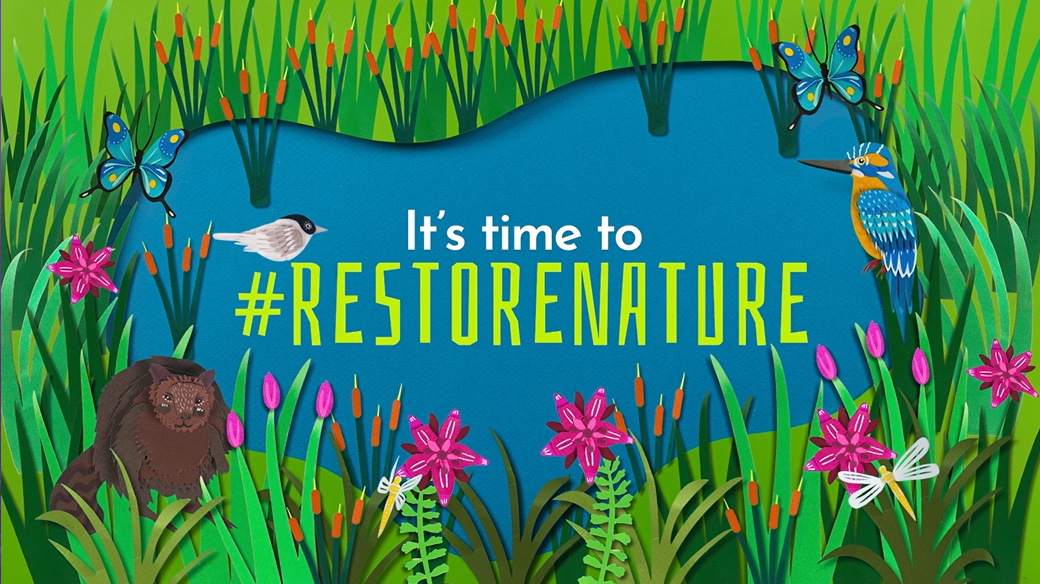Nature Restoration Law one step closer to becoming reality – but with loopholes
Intense trilogue negotiations concluded tonight

Brussels, 10 November 2023 Late Thursday night, the intense negotiations between the EU Parliament, Commission, and Council concluded on the eagerly awaited Nature Restoration Law, resulting in a political agreement between the three institutions.
While we are pleased to see that all ecosystems originally covered by the law are still included in the agreement, the articles have been watered down compared to the original Commission’s proposal and the Council’s position. It is disappointing to see the many exemptions included, and the excessive flexibility regarding obligations for Member States.
Below follows our initial reaction to the main components of the agreement:
- The scope of terrestrial restoration has not been restricted to Natura 2000 sites exclusively, but significant loopholes were added which can decrease the total area to be restored.
- The requirement to prevent deterioration has been severely undermined, making it difficult to implement.
- Fortunately, concrete requirements to increase nature on farmlands, as well as restore peatlands made it into this agreement, but the reintroduction of the article came at a high cost, with significant concessions being made, such as introducing the possibility to pause the implementation of the legislation – also referred to as the ‘emergency brake’.
The so-called trilogue negotiations are reported to have been challenging as the Council and Commission worked to find common ground with Parliament’s significantly weaker position.
The law, initially designed to implement measures aimed at restoring a minimum of 20% of the EU’s nature on land, rivers, and seas by 2030, unexpectedly became the target of an aggressive disinformation and scaremongering campaign led by Manfred Weber’s EPP group, aiming to prevent this law from ever seeing the light of day. As a result, numerous targets were watered down when the Parliament's position was adopted. Many compromises and concessions were made to accommodate all parties involved, with the expectation of gaining support even from the most conservative factions.
As shown by the latest HELCOM holistic assessment - HOLAS 3, the Baltic Sea is not in a good state. All actors must intensify the efforts and the collaboration towards a healthy and sustainable Baltic Sea and environmental resources and ecosystems in Europe. "Both passive and active ecological restoration strategies are needed, along with the implementation of ambitious, effective and concrete local and outsourced measures. The future role and importance of the Restoration Law will depend on its active nature and specific obligations, surpassing the more general targets of the EU Biodiversity Strategy ", commented Andrea Cervantes, CCB Biodiversity Officer.
The call for an impactful Nature Restoration Law received unprecedented support from over one million citizens, businesses, scientists, and multiple other stakeholders [1].
The agreement reached must now be endorsed by Member States, as well as undergo a crucial vote by the EU Parliament’s Environment committee, later this year, where conservative groups may attempt to torpedo the law once again.
If the proposal successfully navigates these steps, it will subsequently go through a final rubber-stamp vote during the Parliament’s plenary vote, expected to take place in December 2023.
We now call on Member States and the EU Parliament to approve this trilogue agreement, and not delay the much-needed restoration work that will help the EU fight the climate and nature crisis.
NGOs COMMENTS
Sofie Ruysschaert, Nature Restoration Policy Officer, BirdLife Europe:
“We are relieved to see that the negotiators have not completely failed European citizens. The inclusion of restoration targets for farmlands and drained peatlands gives us a modest chance for a brighter tomorrow, as our ability to have food and clean water depends on these ecosystems being healthy and biodiverse. But the true litmus test lies in whether this law will really address the staggering repercussions of the climate and nature crisis. And that will only be seen if and when Member States properly implement the law.”
Ioannis Agapakis, Nature Conservation Lawyer at ClientEarth:
“We finally have a much-needed law that in theory, would force the EU to take concrete action to restore its ailing nature. However, negotiators have hollowed out the law to the point that it risks being toothless in practice and prone to abuse. The numerous exemptions and lack of legal safeguards have set a very frightening precedent for EU law-making, rather than cementing the EU at the forefront of biodiversity conservation. Failing to recognise our vital dependence on nature will leave Europeans exposed to the disastrous impacts of the climate and biodiversity crises."
Sergiy Moroz, Policy Manager for Water and Biodiversity at EEB:
“Despite significant concessions made to the opponents of the impactful Nature Restoration Law, the provisional agreement includes several positive elements such as targets to reverse the decline in pollinators or restore free flowing rivers. It is imperative that the law is now formally adopted by the co-legislators before the EU elections in 2024, and its implementation starts without delay to also enable EU to fulfil its global commitments on climate and biodiversity.”
Sabien Leemans, Senior Biodiversity Policy Officer at WWF European Policy Office:
“While this deal is more ambitious than the weak Parliament position, it is still a far cry from what science tells us is necessary to tackle the climate and biodiversity emergencies. Yet, given the fierce opposition to the law, we are relieved that an agreement was reached. Without this, the EU’s international credibility would have suffered severely. There is hope now that the EU will make concerted efforts to bring nature back, for the sake of biodiversity, people and our climate - it's the best chance we have.”
ENDS.
Notes for editors:
[1] The Nature Restoration Law has received support from EU Member States, the wind energy and solar industry, scientists, the progressive farming community, European hunters, financial institutions, European mayors, an increasing number of companies and business associations and European youth. Almost 1,200,000 signatures and messages for an ambitious Nature Restoration Law have been collected through various campaigns, which were launched by the #RestoreNature coalition (incl. Avaaz), WeMove, etc.
[2] For more information about the Nature Restoration Law, please visit, www.restorenature.eu or
https://www.ccb.se/restorenature-campaign
For more information, please contact:
Honey Kohan, Communications Manager, BirdLife Europe:
honey.kohan@birdlife.org
+32 482 55 95 43
Ola Miklasińska
Communications Officer, Biodiversity
amiklasinska@wwf.eu
+32 456 37 60 64
Bianca Vergnaud,
EU Communications Manager, ClientEarth
bvergnaud@clientearth.org
+32 471 88 70 95
Federica Pastore
CCB Communication Officer

